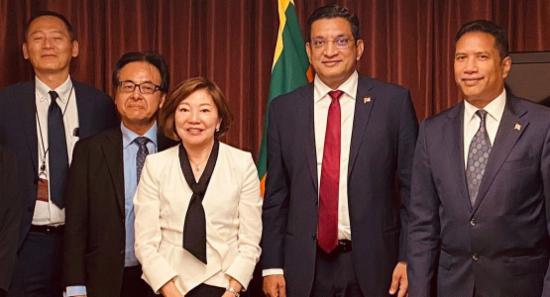.webp)

Supreme Court Calls For Amendments To "Public Financial Management" Bill
COLOMBO (News 1st); Speaker Mahinda Yapa Abeywardena relayed the findings of the Supreme Court regarding the Bill titled “Public Financial Management,” which underwent scrutiny in the apex court pursuant to Article 121(1) of the Constitution.
The Supreme Court examined the constitutionality of various clauses within the Bill, offering detailed insights on discrepancies that require rectification to align with constitutional frameworks.
The Supreme Court determination sheds light on specific clauses that are deemed inconsistent with constitutional provisions and mandates necessary amendments for compliance.
Among the key areas highlighted by the Supreme Court, the discrepancies in Clause 3(2)(b)(iv), Clause 5(2)(f), Clause 32(3), Clause 34(2), and others have been pinpointed as violative of specific articles within the Constitution, necessitating parliamentary majority approval and, in some instances, approval by the people through a referendum.
The Supreme Court's determination underscored the need for significant alterations in the Bill, including amendments to definitions, provisions on state-owned enterprises, and other crucial aspects to ensure compliance with constitutional standards.
Supreme Court Determination:
I wish to inform Parliament that I have received the Determination of the Supreme Court in respect of the Bill titled “Public Financial Management” which was challenged in the Supreme Court in terms of Article 121(1) of the Constitution.
In the said determination, the Supreme Court has summarized the Constitutionality of the Bill as follows:—
Clause 3(2)(b)(iv) and the definition of ‘members of the judicial service’ are inconsistent with Article 4(c) read with Article 3, Article 12(1) and Article 108 and shall only be passed by the special majority of Parliament and be approved by the People at a Referendum. Such inconsistency shall however cease if the definition of ‘members of the judicial service’ in Clause 71 is deleted and Clause 3(2)(b) is deleted and substituted with the new sub clause as set out in the summary of the Determination of the Supreme Court.
Clause 5(2)(f) is violative of Article 12(1), 43(1) and 52(2) and hence , Clause 5(2)(f) shall only be passed with the special majority of Parliament. The said inconsistency shall however cease if Clause 5(2)(f) is amended as set out in the summary of the Determination of the Supreme Court.
Clause 32(3) is violative of Article 3 and Article 12(1) of the Constitution and shall be passed by the special majority of Parliament and shall be approved by the People at a Referendum. The said inconsistency shall however cease if Clause 32(3) is amended as set out in the summary of the Determination of the Supreme Court.
Clause 32(4) is inconsistent with Articles 3, 12(1), 148 and 156C of the Constitution and shall only be passed by the special majority of Parliament and be approved by the People at a Referendum. The said inconsistency shall however cease if Clause 32(4) is amended as set out in the Summary of the Determination of the Supreme Court.
Clause 34(2) is violative of Article 149 of the Constitution and shall only be passed with the special majority of Parliament. The said inconsistency shall however cease if Clause 34(2) is amended as set out in the summary of the Determination of the Supreme Court.
Clause 38(3) is inconsistent with the provisions of Article 12(1) and 148 of the Constitution and shall only be passed with the special majority of Parliament.
Clause 39(1) is inconsistent with Article 12(1) and shall only be passed by the special majority of Parliament. The said inconsistency shall however cease if Clause 39(1) is amended as set out in the summary of the Determination of the Supreme Court.
Clause 63 is inconsistent with Article 4(c) read with Article 3, Article 12(1), Article 55(1), Article 55(3), Article 108, Article 111H(1)(b), Article 148, Article 153C, Article 155G(1) and Article 156F of the Constitution and shall be passed by the special majority of Parliament and shall be approved by the People at a Referendum. The said inconsistency shall however cease if Clause 63(2) is amended as set out in the summary of the Determination of the Supreme Court.
Clause 68 is inconsistent with Article 12(1) of the Constitution and shall only be passed with the special majority of Parliament. The said inconsistency shall however cease if Clause 68(1) is amended as set out in the summary of the Determination of the Supreme Court.
Clause 69 is violative of Article 4(a) read together with Article 3 and 76 and hence, needs to be approved by the special majority of Parliament and by the People at a Referendum.
The definition of ‘State Owned Enterprise’ is inconsistent with Article 12(1) and Article 148 of the Constitution and shall only be passed with the special majority of Parliament. Such inconsistency shall however cease if the said definition is amended as set out in the summary of the Determination of the Supreme Court.
I order that the Determination of the Supreme Court be printed in the Official Report of today’s proceedings of the House
Other Articles
Featured News





.png )

























.gif)